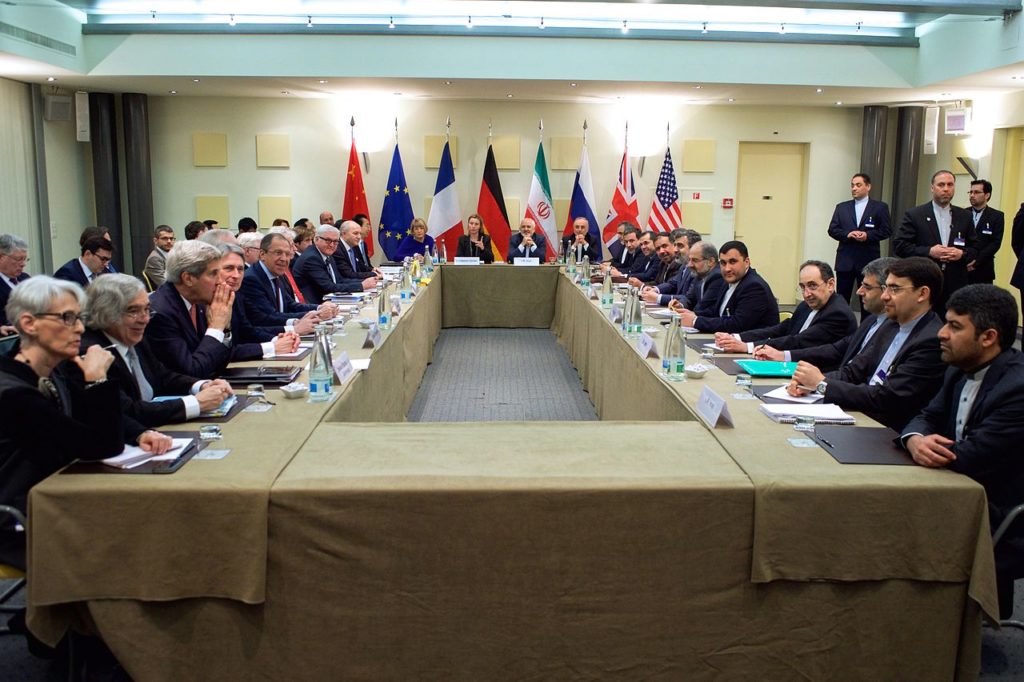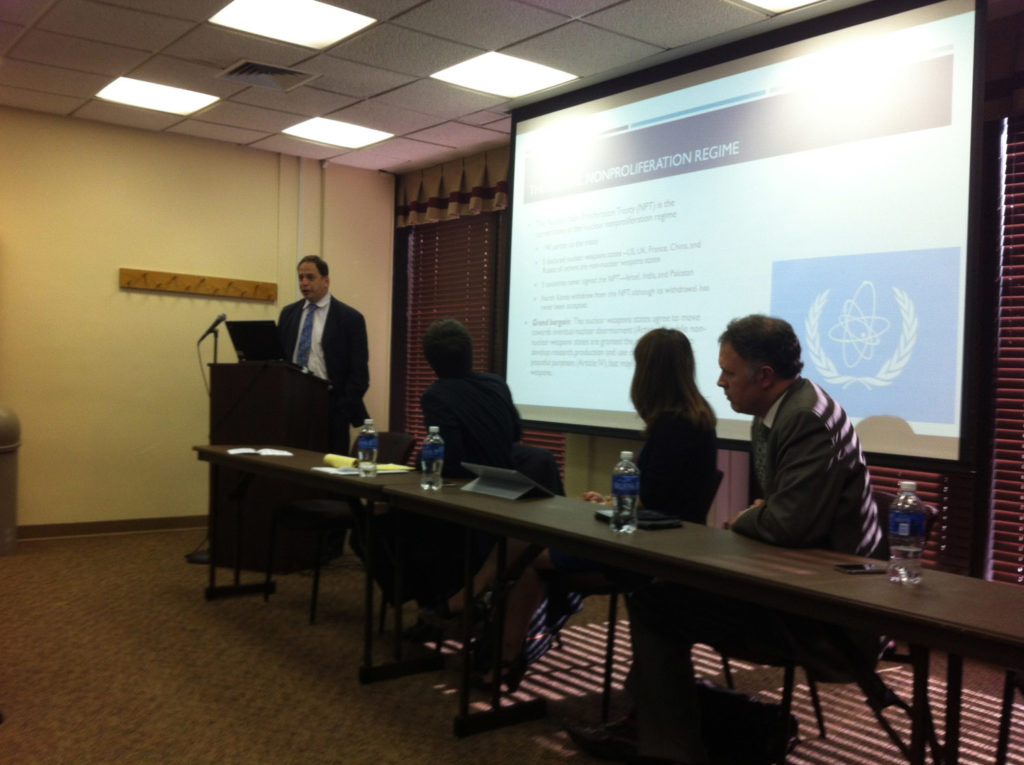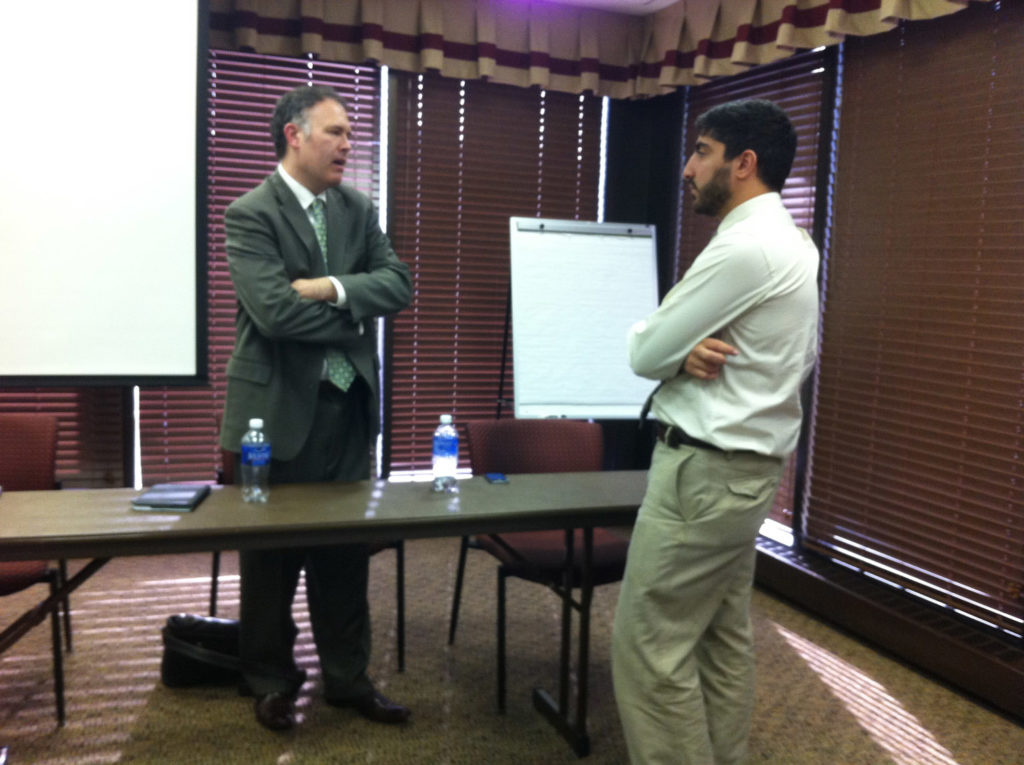
The ministers of foreign affairs of the United States, the United Kingdom, Russia, Germany, France, China, the European Union and Iran.
Photo courtesy of wikipedia.org
The Department of Political Science and Law, the Asian Studies Undergraduate Minor and the Global Education Center sponsored a Forum on International Relations on Monday Nov. 9. The event, organized by the Korea Economic Institute of Academic Outreach, was titled “The Last Rogue State? Handling North Korea after the Iran Nuclear Deal.” The panel had three analysts from Washington DC come in and talk to students about the different sides and perspectives on the North Korean nuclear talk and how it is similar and different from the most recent Iran nuclear deal.
Panelist Jenny Town, assistant director at the US-Korea Institute at Johns Hopkins School of Advanced International Studies, presented on the North Korea talks and explained that it has been difficult for the U.S. to find a nuclear agreement with the isolated country. “North Korea is a high priority for the U.S. in terms of non-proliferation without any easy answers and without a strategy on how to solve it,” said Town.
She went on about the history of North Korea, that the regime is relatively stable but has experienced purges as well. Her bottom line was that the previous course that the U.S. and the international community has taken toward North Korea, isolationism, is not working. Town suggested short-term objectives and long-term goals for denuclearization as potential strategies. However, she believes that right now Washington “doesn’t have the political appetite to pursue a kind of engagement strategy.”
The other two panelists, Paul Kerr, an analyst in nonproliferation at the Congressional Research Service, and Miles Pomper, a senior fellow from the James Martin Center for Nonproliferation Studies at the Middlebury Institute of International Studies, focused their talks on the Iran nuclear deal as well as some of the similarities and differences between Iran and North Korea concerning their nuclear weapons capabilities.

Miles Pomper talking about the differences between the North Korea nuclear talks and the recent Iran Nuclear Deal.
Photo Credit: Awije Bahrami
These two panelists said that, so far, it seems that Iran has complied to its part of the deal by providing the International Atomic Energy Agency (IAEA) with answers to the questions that were posed about their nuclear program. Now, the U.S. is ready to lift some of the lighter sanctions imposed on Iranian trade.
Pomper said that the U.S. doesn’t “have lots of leverage over North Korea, because we aren’t as integrated with their economy.” Also, the North Korean population has close to no knowledge of the Western world and, partly because of propaganda, doesn’t want to have any part in it. On the other hand, the only obstacle preventing the U.S. from doing business in Iran are sanctions and the vast majority of Iranians know, either directly or indirectly, a lot about the Western world and want to be part of it.
Also, North Korea is known to have six nuclear weapons ready for usage, while Iran is known to have the capability to enrich uranium to a high level, but has not developed any nuclear weapons.
The two panelists came to the conclusion that full denuclearization is unlikely at this point. However, analysts and diplomats are working towards a deal that is similar to the Leap Day Agreement, in which North Korea agreed to cease producing nuclear weapons temporarily in exchange for food aid from the U.S. and other nations.
The panel was followed by a session where students and professors were able to ask questions that ranged from different approaches in dealing with North Korea, like rewards instead of isolation, to future U.S. relations with the two countries.
Elizabeth Wishnick, a professor of Political Science and Law at Montclair State and the coordinator of the Asian Studies Undergraduate Minor, said that she encountered the Korea Economic Institute of America at a conference on Asian studies in Chicago. She found out about the terrific opportunities that the Institute offers, one of which was the ability to bring programming about Korea for free to college campuses. “I thought they should come here, where we have almost no course work on Korea,” Wishnick said.
Wishnick further explained that it was a great opportunity for students to hear what real policy experts have to say about late breaking issues like the Iran nuclear agreement and to “learn about issues they don’t know about, perhaps the North Korean situation.”
Upon asking what she hopes students take away from the panel, Wishnick said, “I hope they’ll think about the Korean peninsula in new ways [and] think about the threats and maybe the opportunities for change there.”
Rowan Lambie, a junior Political Science major said that the talk was interesting. She learned about different perspectives on North Korea that Montclair State students usually never see. “All three presenters knew their topic and presented it from the perspective of someone from Washington and they made it easy to understand as a student,” Lambie said.
When asked about what she took away from the talk, Lambie said, ”North Korea doesn’t have incentives to work with the U.S. Currently, nuclear power is of greater draw and they already have economic partners with China, so they don’t need outside trade.” Lambie continued, “It showed isolation from a different perspective. Isolation to its extreme can be a powerful position.”




